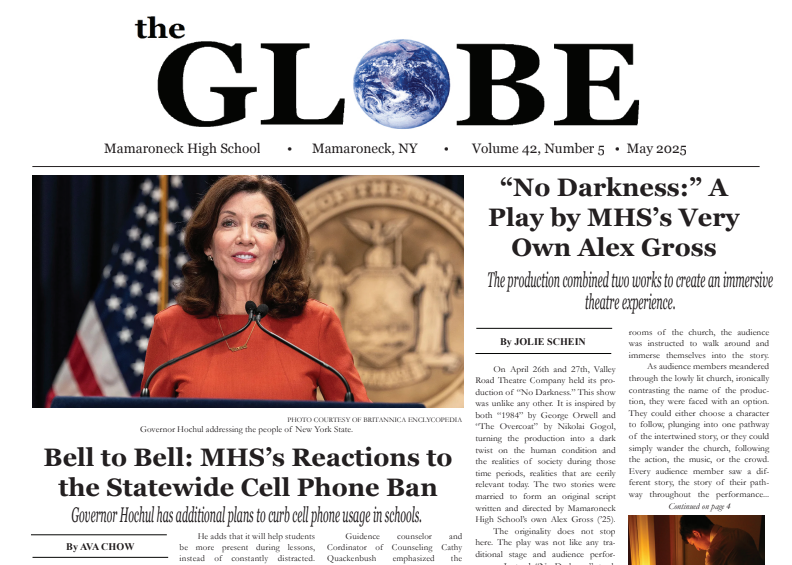We Must Evaluate the Risk of High School Sports
November 11, 2020
When schools finally reopened for the beginning of the new school year, the voices of students, begging to return to a world with sports, were blaring and persistent. Athletes at MHS found themselves at a loss without a normal season. For most, being on a team comes with far more than a jersey and a pair of cleats. It requires one to push themselves beyond their comfort levels, and it sparks a competitive nature. It can also create a deep rooted love for physical activity while kids are still young, and teach students how to interact with athletes across grades and schools. Needless to say, sports at Mamaroneck High School are not only a necessity, but a way of life.
While all sports seem crucial to the students that participate in them, only a handful of low contact teams have been allowed to hold practices. At MHS, this includes Boys and Girls Soccer, Field Hockey, Tennis, and Boys and Girls Cross Country. Many of these sports had to make serious changes, but at least they are currently in session. Now for the real issue. Practices are being held. Masks are being worn. So what comes next?
Meets, matches, and games are at the heart of all things sports related. Putting different schools in head to head combat encapsulates the core belief that fuels every athlete: competition. But what happens if you take that objective away? In a world where standing within 6 feet of another human is prohibited, it has proven rather difficult to hold these essential matches. At Mamaroneck High School, this issue is a fairly fresh one. In the past few weeks, the first games of the season have been played for the six sports being run. The nerves of a normal season are heightened during the pandemic, and then covered by a mask.
When asking the captain of the Mamaroneck Girls Varsity Soccer Team how the start of game season was going, Marianna Day explained that “playing with a mask is super tough, but [she does] keep [hers] on until given a mask break.” She goes on to say that, although she is confident in the protection of their masks, the “bigger worry would be if [the team] expanded [their] reach” to play in larger tournaments or sectional championships. Day does believe that if the team “had waited till the spring season, the rules would have lightened up,” but she is happy to get any chance to play with her team for her last year.
But, Day does make an excellent point: What happens if we continue to expand our reach? According to the CDC, competing with schools from outside the local community will likely increase the exposure to COVID-19 among athletes and coaches. The CDC assesses the danger from the closeness of these sports, as well as the size of the teams. Athletics were always a risk, and they created yet another way to spread the virus.
Taking a look at the other side of the field, Dimitris Repoulis dives into his experience as a Mamaroneck Boys Varsity Soccer player. He seems to agree with Day in that he finds the mask “hard to keep on, especially when you start sweating.” It doesn’t take more than a few sprints down the field for the discomfort to kick in. Repoulis is undoubtedly concerned about the coronavirus, and he explains that everyone is making sure they “don’t put anyone in danger and get the program shut down.” That being said, he is more optimistic than most. To look on the bright side of things, Repoulis explains that the whole team is happy to “get out on the field… play the sport that [they] love… and represent [their] school. He adds, “We build a bond with our teammates that lasts forever. That’s a once in a lifetime experience that we are blessed to take advantage of.” With a headspace like that, how could anyone take sports away from high school students? They mean so much to the kids that participate, so Repoulis seems to believe it is worth the risk.
Looking at a sport in which less physical contact is made, Sydney Warwick gives her take on sports matches as a member of the Mamaroneck Girls Varsity Tennis Team. Like most, she argues that while the masks can make it “difficult to catch [her] breath,” it is all worth it as long as they “get to have a season.” Her nerves about mixing schools is understandable, but she points out that matches are essential because it gives athletes “a chance to prove [themselves] to other schools.” When you take matches and games away, “the excitement and nerves about playing matches wouldn’t be there. That is what makes playing fun.”
There is a large scale that measures whether or not participating in a sport is worth the risk during a global pandemic. On the one hand, participating in physical activities increases the risk of being exposed to the Coronavirus. Then again, so does going to school. So does riding the bus. So does taking a trip to the grocery store. All of these things must be weighed on that scale of importance to uncover what is worth it to each of us.





